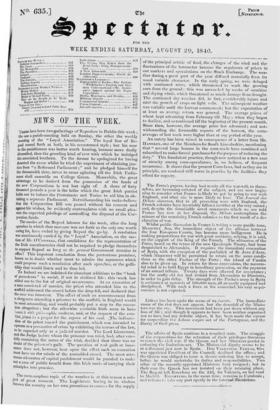NEWS OF THE WEEK.
mos have been two gatherings of Repealers in Dublin this week ; the one a parish-meeting held on Sunday, the other the weekly meeting of the "Loyal Association." The loyal lion of Re- peal roared forth at both, in his accustomed style ; but his roar to the parishioners was better worth hearing, because more drolly diversified, than the growling kind of roar with which he indulged the associated brethren. To the former he apologized for having deserted the cause whilst he tried the experiment of obtaining jus- tice from "a Reformed Parliament ;" and he pledged himself for the thousandth time, never to cease agitating till the Irish Parlia- ment shall assemble on College Green. Meanwhile, the great advantage to be derived from the possession of the funds of the new Corporations is not lost sight of. A share of forty thousand pounds a year is the bribe which the great Irish patriot holds out to induce the Protestants and Tories to aid him in ob- taining a separate Parliament. Notwithstanding his make-believe that the Corporation Bill was passed without his consent and against his wishes, he evidently contemplates with no small plea- sure the expected privilege of controlling the disposal of the Cor- poration funds.
The results of the Repeal labours for the week, after the long speeches in which that measure was set forth as the only one worth caring for, have ended by giving Repeal the go-by. A resolution was unanimously carried by the " Loyal" Association, on the mo- tion or Mr. O'CoNsims, that candidates for the representation of the Irish constituencies Shall not be required to pledge themselves to support Repeal so long as Me present Government remains in office! This impotent conclusion from the portentous premises, leaves us in doubt whether most to admire the assurance which could propose such a resolution after such speeches, or the gulli- bility that would listen and be thus led.
To Ireland we are indebted for abundant additions to the "book of precedents" in social, if not in civilized life : this .week has added one to the list of original occurrences. At an execution of a man convicted of murder, the priest who attended him to the scaffold addressed the crowd before the drop fell, and declared that the man was innocent. The effect of such an announcement from a clergyman attending a prisoner to the scaffold, in England would be most astounding, and would probably put a stop to the execu- tion altogether ; but the otherwise excitable Irish seem to have beard it with philosophic coolness, and, at the request of the con- Viet, joined in a prayer for the repose of his soul. Tlie indiscre- tion of the priest caused the punishment, which was intended to Operate as a preventive of crime by exhibiting the terrors of the law, to be regarded only as a judicial murder. The Lord Lieutenant, and the Judge before whom the prisoner was tried, bad, after care- fully examining the notes of the trial, decided that there was no doubt of the prisoner's guilt. The question of real guilt or inno- cence does not, however, bear upon the effect such an execution must have on the minds of the assembled crowd. The most stre- nuous ddvocates of capital punishment would be puzzled to make out a case of public benefit from this Irish mode of carrying their Principles into practice.


























